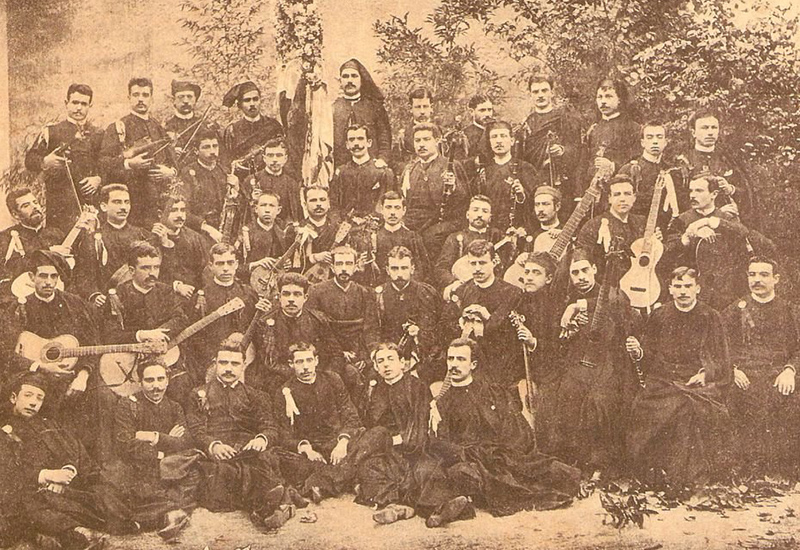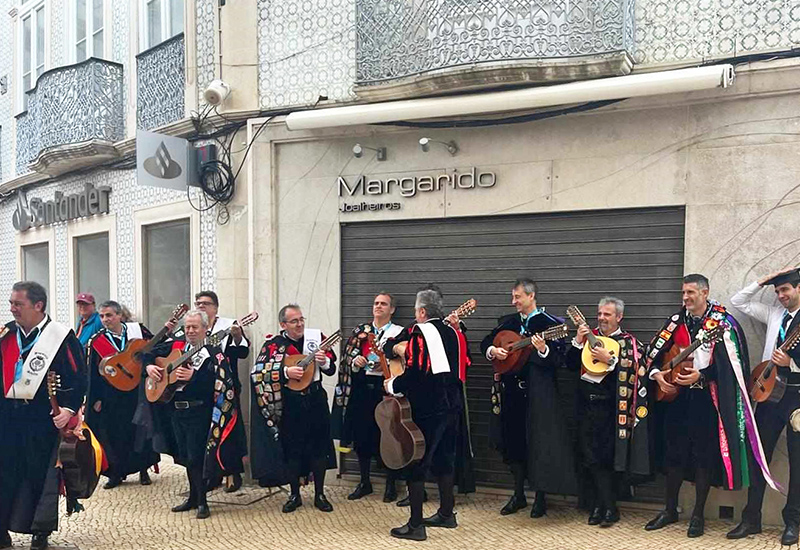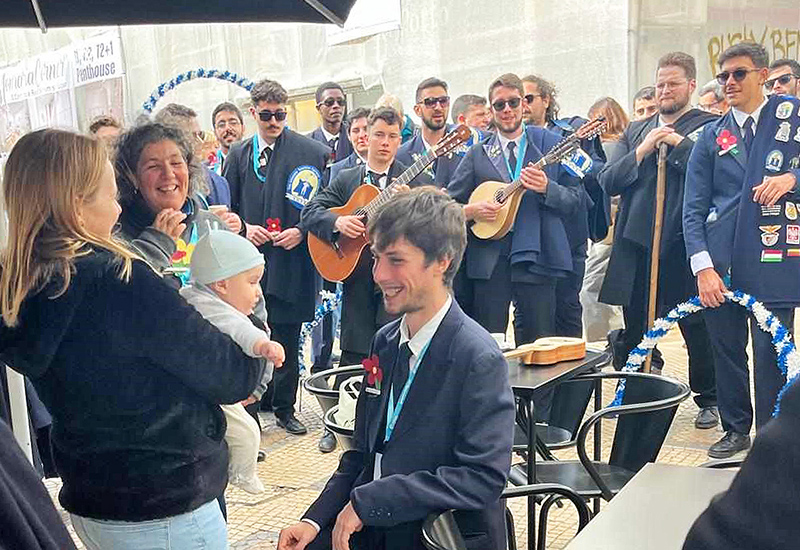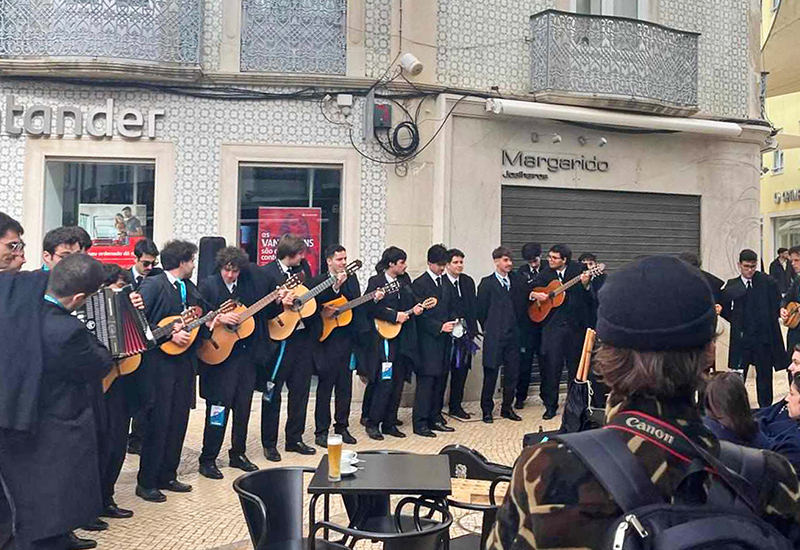The Tuna, not to be confused with the fish, has been a tradition in Portuguese and Spanish universities for centuries. Groups of students and academics still come together to sing, dance, and play music to preserve this historic tradition, which has been a vital part of academic life across the Iberian peninsula since the 13th century.
The academic tradition is believed to have started in Spain, where students would serenade villagers in a bid to earn money for food. The idea swept across to Portugal, where it became a staple in many universities as a way to have fun and earn money at the same time.
According to legend, the name Tuna is believed to have come from the King of Tunis, who was known to walk the streets playing instruments and partying with his loyal subjects. Whilst modern-day Tuna groups aren’t out partying for money, students still keep the Tuna tradition alive, playing at events and even competing with other Tuna groups in a bid to become the champion Tuna.

Last month Versus Tuna from the University of the Algarve in Faro hosted the 23rd International Festival of Academic Tunas, known as Fartuna, to pay homage to the city of Faro. The two-day event hosted visiting Tunas as they went head to head, competing to take home the title of Melhor Tuna (the Best Tuna). In true traditional style, groups from the Azores, Coimbra, Porto and Seville in Spain hit the streets of Faro’s downtown to serenade passers-by and pull out their best material to impress the judges from Versus Tuna.
Dressed in traditional costume, which are similar to a formal suit with petticoat breeches, the dress is completed with arguably the most important garment of the Tuna, the capa. The loose-fitting cloak, symbolic of the Tuna tradition and unique to each university, is adorned with numerous badges, each representing an important part of the Tuna’s academic life. The badge, known as a shield or escudo, starts with the emblem of the university, followed by the faculty, country flag and, often, the flag of the European Union. Various other badges representing home towns, cities, different countries, and messages of affection from loved ones, are gifted to the Tuna by their friends, families, and partners. In times gone by, the capa was used as a way to avoid punishments for busking by the police, which was frowned upon in medieval Portugal.
Likewise, the Spanish counterpart of the Portuguese capa is decorated with multicoloured ribbons, gifted by mothers, friends, and significant others. In the words of D. Martinez Pinto and M. Menéndez Vigo from the University of Santiago de Compostela, “Every ribbon that decorates my cloak, keeps a piece of heart.”
As a complete novice in the world of Portugal´s academia, I sat down with Pedro, a second-year freshman in Versus Tuna, to learn a little more. Pedro entered the Tuna two-and-half-years ago in a rather unusual way. Pedro explained, “When I got into university, one of our hazing traditions (a light-hearted voluntary team-building exercise between older and younger students) was to auction the freshmen to different majors or groups within the university. I ended up being “sold” to Versus Tuna and spent the evenings with them being introduced to their music. I had never played an instrument, but I had always had an interest in it, so I took the opportunity to join the Tuna in the hopes of learning an instrument during our meet-ups.”
Pedro became accustomed to Tuna life, making new friends and learning how to play the cavaquinho – the Portuguese guitar. It’s the participation in festivals up and down the country and even abroad that he enjoys as well as the public recognition. “I like the camaraderie and the relationships you make within the Tuna. It’s very common for us to get recognised when we go out as a group to the academic nightlife of Faro, and we always end up meeting tons of new people. One of my favourite memories was when we were in an Irish Pub in Faro and we ended up being dragged on stage and staying there for the rest of the night with customers buying us beers and talking to us about our group.”
I marvelled at the vast array of badges sewn onto Pedro’s cloak. When I asked which badge was his favourite, he pointed to a comical slur, which I am unable to repeat here. The Tuna are known for their love of a drink and a joke and it’s this jolly nature which makes the Tuna unique: a mix of showmanship and musical talent combined with camaraderie and light-hearted humour among friends and revellers.
As Pedro returned to his duties as festival barman, I took cover under an umbrella outside one of the many quintessential cafés in downtown Faro where the Tuna competition would be judged. The sound of guitars and drums echoed through the cobbled alleyways as the first Tuna group approached us enthusiastically despite the torrential downpour of rain. Led by their banner, the Tuna of the Azores broke out into song and dance, egging the crowd on to join in with several well-known popular songs and self-created musical numbers. Known officially as the Tuna Universitas Scientiarum Agrariarum, the group soon drew a crowd of other Tunas, locals, and curious tourists interested in learning more about this academic festival. After dedicating a song to a mother and her baby watching from the shelter of the café (to the delight of onlookers), the Tuna of the Azores took their bow before marching off into the distance as we awaited the next contestants.

The ever-flamboyant Tuna of Seville, known as La Tuna de Magisterio de Sevilla, merrily pranced their way towards the judging table before marching and countermarching to the beat of their music. Dressed in colourful cloaks, with their ornate ribbons distinguishing themselves from their Portuguese counterparts, the Spaniards took advantage of their heritage by mixing a collection of traditional melodies and modern songs, swinging and dancing in unison, bringing a party-like atmosphere to the now bustling alleyway. Consisting of mainly older Tunas, the loud, extravagant serenade ended in true Spanish style, with an Olé and a coffee and a cigarette before heading off for their next performance by the marina.
The University of Coimbra is one of the oldest universities in the world and the oldest in Portugal after its foundation by none other than my ancestor, King Denis I of Portugal, in 1290. The aptly named Imperial Tuna Académica da Faculdade de Farmácia da Universidade de Coimbra or Imperial TAFFUC for short, was led by the regal-looking purple banner. Undeterred by their Spanish competitors, the group burst into song with tambourines and danced in perfect unison as the crowd clapped along and ended in rapturous applause for Portugal’s historic university. With a selection of instrumental numbers and solo spots, the Tunas from Coimbra ended their performance in true Portuguese style, toasting one another with a glass of beer, which I assume wasn’t the first one of the day.
The final Tuna of the competition was the Tuna Académica do Instituto Superior de Engenharia do Porto, who took a somewhat different approach to the typical Portuguese guitar. Playing a Russian-inspired melody on a balalaika, onlookers jeered as two tambourists mimicked the prisyadka dance, which was well received by both the crowd and the judges. As the tambourists competed against each other, the banner bearer swirled and juggled the Tuna banner in time with the sound of guitars, flutes, and tambourines, giving any professional juggler a run for their money.

As the competition came to a close, the streets of downtown Faro returned to their usual tranquil state, and the judges headed off to evaluate their results, leaving the Tunas to prepare for a night of song and dance on stage at the Conservatório Regional do Algarve. The evening event showcased each Tuna and the eagerly awaited results of the 23rd International Tuna Festival competition were announced.
With eight categories up for grabs, the Tuna of the Azores walked away with the title of best instrumental, whilst the Tuna of Porto won in two categories for best serenade and best pasacalles (a musical form that originated in early 17th-century Spain). The Tuna of Coimbra won in four categories: the best banner, the best tambourinist, the best soloist, and the best Tuna performance. However, the winner of the best Tuna in spirit, or the Melhor Tuna, was the Spanish La Tuna de Magisterio de Sevilla, who returned home victorious to Spain.
My day with the Tunas showed me another aspect of the cultural life of an Iberian student. Along with the costumes, dances, comedy, and varying musical abilities, it is the brotherhood it creates and the lifelong friends made along the way that make the Tuna successful. So, if you see a Tuna group, why not raise a glass for the students and congratulate them on their studies? Who knows, they might even play for you, not for money but for their love of this ancient tradition and friendship.
Photos © Luka Alexander and Jasmijn dos Santos













